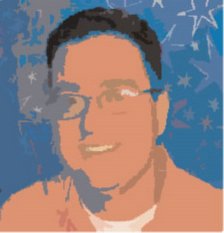Stanford Singularity Summit
Attended the Stanford Singularity Summit today. Congratulations to The Singularity Institute (http://www.singinst.org/) and the Symbolic Systems Program at Stanford for an excellent event.
Particularly of interest to me were the talks by John Smart, Cory Doctorow, Eliezer Yudkowsky and Ray Kurzweil. Sebastian Thrun did a commercial for the DARPA Grand Challenge, and Bill McKibben played an excellent Cassandra, arguing that less is more when it comes to strong AI and immortality.
Kurzweil started the event off in dramatic fashion as he demoed a new, portable text reader in trials with the National Federation of the Blind. Later in his case, he showed a video of a new real-time spoken language translator. Moving between English, German, Spanish and French. In both cases, he was illustrating the "law of accelerating change" at work.
Cory Doctorow (or on BoingBoing) gave a great monologue on the evils of digital rights management, but the audience seemed to be decidely split on the rights of publisher vs. the consumer. The issue was a recurring theme - as it relates to information ownership of genes and new biological creations just as much as it applies to National Treasure. Another entertaining moment came when McKibben appeared at the conference is a virtually 3-D image courtesy of technology from Teleportec.
K. Eric Drexler gave a sales pitch for nanotech in general and the nanofabrication simulation software that his company, Nanorex, makes.
The concept of pattern matching came up frequently. Kerzweil proclaimed that pattern recognition is the heart of human intelligence. His language translator is based on pattern recognition work, and he even put in a reference to Doug Lenat at Cycorp. Google came up repeatedly as a harbinger of the Singularity. The panelists practically tripped over each other citing examples of how Google is a purveyor of singularitarian principles, the Wisdom of Crowds, etc. Perhaps I should revisit my sell call on Google from last December?
One of the most interesting threads on Google was the discussing on context dependent grammar. Look at the length of search queries that return accurate results on Google. The panelists claim that today's searches are up to 2.6 words of relevancy, from 1.8 in 2000. Accelerating returns project the length will double and double again in the next 10 years, leading to an effective pattern match of a sentence of almost 12 words long. This means that in 2015 you might be able to ask something like: "What did Shakespeare call someone who poured cold water on an argument", and get back "Cassandra" :-)
That might be enough to pass my version of the Turing Test!
Particularly of interest to me were the talks by John Smart, Cory Doctorow, Eliezer Yudkowsky and Ray Kurzweil. Sebastian Thrun did a commercial for the DARPA Grand Challenge, and Bill McKibben played an excellent Cassandra, arguing that less is more when it comes to strong AI and immortality.
Kurzweil started the event off in dramatic fashion as he demoed a new, portable text reader in trials with the National Federation of the Blind. Later in his case, he showed a video of a new real-time spoken language translator. Moving between English, German, Spanish and French. In both cases, he was illustrating the "law of accelerating change" at work.
Cory Doctorow (or on BoingBoing) gave a great monologue on the evils of digital rights management, but the audience seemed to be decidely split on the rights of publisher vs. the consumer. The issue was a recurring theme - as it relates to information ownership of genes and new biological creations just as much as it applies to National Treasure. Another entertaining moment came when McKibben appeared at the conference is a virtually 3-D image courtesy of technology from Teleportec.
K. Eric Drexler gave a sales pitch for nanotech in general and the nanofabrication simulation software that his company, Nanorex, makes.
The concept of pattern matching came up frequently. Kerzweil proclaimed that pattern recognition is the heart of human intelligence. His language translator is based on pattern recognition work, and he even put in a reference to Doug Lenat at Cycorp. Google came up repeatedly as a harbinger of the Singularity. The panelists practically tripped over each other citing examples of how Google is a purveyor of singularitarian principles, the Wisdom of Crowds, etc. Perhaps I should revisit my sell call on Google from last December?
One of the most interesting threads on Google was the discussing on context dependent grammar. Look at the length of search queries that return accurate results on Google. The panelists claim that today's searches are up to 2.6 words of relevancy, from 1.8 in 2000. Accelerating returns project the length will double and double again in the next 10 years, leading to an effective pattern match of a sentence of almost 12 words long. This means that in 2015 you might be able to ask something like: "What did Shakespeare call someone who poured cold water on an argument", and get back "Cassandra" :-)
That might be enough to pass my version of the Turing Test!

